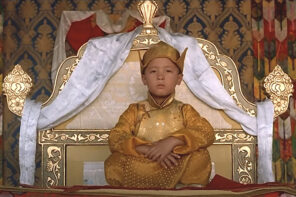His Holiness the 14th Dalai Lama, Tenzin Gyatso, began a two-week U.S. speaking tour by meeting with President Obama last Friday. After annoying the Chinese government with a private presidential audience, he quickly winged it west to offer enlightenment to the devoted and the curious on the Left Coast, traveling from receptive audiences in Berkeley, Santa Clara, and Los Angeles before a swing through the heartland on his way back to D.C. for a final engagement next Friday.
His official schedule shows a certain thematic predictability in his talks, which generally highlight happiness, fulfillment, and compassion—key nodes of Buddhist thought and the subject of the many books he has published over the past fifty years. As an author, a speaker, and a gatherer of often otherwise disparate devotees, HHDL—if I may—is nothing less than a late modern spiritual mega-brand.
Given this, we might not be surprised that his visit on Monday to Santa Clara University, in the heart of Silicon Valley—land of high octane wheeling, dealing, wealth-making, and, it seems to turn out, existential woe—would focus on “Business, Ethics, and Compassion.”
Sponsored by the Markkula Center for Applied Ethics* and the Center for Compassion and Altruism Research (CCARE) at Stanford University, the event aimed to enlighten alumni, students, faculty, and others from the surrounding business community in the sold-out auditorium on the ways in which practices of compassion can enrich—spiritually and materially—the lives of business people.
Thus, CCARE director James Doty began his introduction of His Holiness by noting the financial consequences of the fast-paced, stress-filled, competitive lifestyles that characterize the entrepreneurial high tech industry. Against this, Doty lifted up the exiled Buddhist leader’s commitment to the clinical study of the effects of meditation and practices of compassion on the deleterious effects of anxiety and depression on the bottom line, integrating science and spirituality by way—as sociologist Courtney Bender might explain—of claiming a secular mode of authority that His Holiness might not require.
HHDL does teach that, “If scientific analysis were conclusively to demonstrate certain claims in Buddhism to be false, then we must accept the findings of science and abandon those claims.” But he hardly sets aside the particular authority of religion itself as it motivates his teachings on compassion in a secular world. Indeed, as he noted during his brief talk, his understanding of “the secular world” is as “including all religions.”
Of course, it would be hard to know what HHDL-styled “compassion” might look like in the corporate world given the confession later in the event by His Holiness that, “I have not much experience here.”
Fortunately, after fifteen minutes of charming, periodically tweetable, if sometimes difficult to understand, commentary from the 78-year old Buddhist leader, health care system CEO Lloyd H. Dean shared a bevy of antidotes on how his Dignity Health, one of the top five health care systems in the United States, enacts practices of compassion in their facilities. To wit: a housecleaning staff member (“they’re now called ‘environmental services,’” Dean explained) eased the burden of a woman recovering from cancer-related surgery by sharing her own story of recovery from the disease. See: there ya go! Bam! Compassion!
So, okay, in terms of deeply meaningful content, well, there didn’t seem to be much there, there, which left many in the media struggling for an angle. Likewise, Riley McShane, an SCU freshman English major (so, you know…) was a somewhat frustrated that the event “seemed more like an advertisement for a hospital than a anything spiritual.”
A thoughtful sort not thoroughly acquainted with HHDL’s teachings, McShane had been “expecting to come away with something significant” after getting up at 5 a.m. to sit in the security screening line in the Northern Cali version of a cold morning, hours before the event’s 10 a.m. start.
But for others, accessing fully developed wisdom teachings was not exactly the point.
Attendees like Brooke Deterline, CEO of an organizational consulting firm focused on ethical practice and workplace performance, came already chock-full of dharmic learning.
For Deterline, presence and inspiration were the centerpieces of the morning. “I think just by being here, His Holiness can inspire people to act from their hearts,” she said. Drawing upon the research-based, secularized Eastern-spirituality-influenced “courageous leadership” approach of her firm, Deterline provided a HHDL-esque summary of the “false contradiction between compassion and commerce” that might have slaked the desire McShane and others in the audience had for deeper insight from the holy man himself.
“Capitalism offers a very backwards way of looking at the world,” Deterline explained.
It’s okay for companies to make profits. That makes them sustainable. That gives people jobs. But there’s tons of research that tell us ‘if you want to be happy, focus on other people; if you want to suffer, focus on yourself.’
For freshman business major James Kraus, the specifics were a bit thinner, but the impact of presence and an assumed ethical teaching of at least some nebulous significance made it easily through the robust security screening. “He’s kind of a rock star,” Kraus said. “I’m really fortunate to get to see someone like this at my own school.” As for his early take on Buddhist teachings and business, Krause was confident that, “having the Dalai Lama talk about being ethical and compassion will be important to my future” in some as yet unspecified way.
Somewhat lost in all of this, of course, is the idea that “compassion”—from the Latin compatio—does not equate to happiness in the sense of deep personal satisfaction, including career success and associated wealth. Rather, it means “suffering with.” It is an act of consequential solidarity that may, indeed, undermine one’s own immediate comfort and satisfaction.
As His Holiness himself puts it, “True compassion is not just an emotional response but a firm commitment founded on reason.” In his provocative Beyond Religion: Ethics for a Whole World, from which he drew small nuggets throughout his SCU talk, he expands this understanding of compassion as a universal ethical principle rather than a specifically religious one.
“The essence of compassion,” he writes, “is a desire to alleviate the suffering of others and to promote their well- being. … [It] is not just sharing experience with others, but also wishing to seem them relieved of their suffering.”
Against this more challenging wisdom, like the Oprah of Kathryn Lofton’s construction, the Dalai Lama of his speaking events appears somewhat “the concept of himself”—a spiritual brand insinuating wisdom, inspiring actualization of a more sympathetic self animated by a measure of kindness toward those with whom they work and live. Hey, who’s not a fan of that?
His Holiness, the 14th Dalai Lama, it turns out: “When compassion, or warmheartedness, arises within us and shifts our focus from our narrow self-interest, it is as if we open an inner door.” Not, that is, a worldly door to a room filled with the various technologies of personal comfort and satisfaction.
At the end of the day, there is much to laud in the gesture of a Catholic university expressing its Jesuit commitment to interreligious engagement, and to ethical practice across the many career paths students will follow, by hosting a figure such as the Dalai Lama. And, that the remarks of His Holiness, however slight in the moment, would be situated in relation to the corporate ambitions that animate many in a comparatively affluent student body present in themselves at least an oblique challenge to the acquisitional orientations of no few students and those in the lush techno-economic valley in which they are privileged to study.
In this light, the soft-spoken challenge of “universal compassion” His Holiness throws down, which “involves gradually expanding one’s circle of concern until it finally embraces the whole of humanity,” is a pedagogical one: How do we learn to move beyond the commodification of education, of wisdom teachers like the Dalai Lama, of compassion itself? Does the Dalai Lama as mega-brand, as rock star, as spiritual presence, reinforce such commercial constructions or invite their dismantling?
“Universities must teach compassion,” His Holiness told the crowd perhaps primed for enlightenment on Monday. After a day of celebrity excitement on the Santa Clara University campus and across the Silicon Valley, it seems that there’s still some homework to do.
* Full disclosure: I teach at Santa Clara University and the Markkula Center has funded my own research on two occasions.




